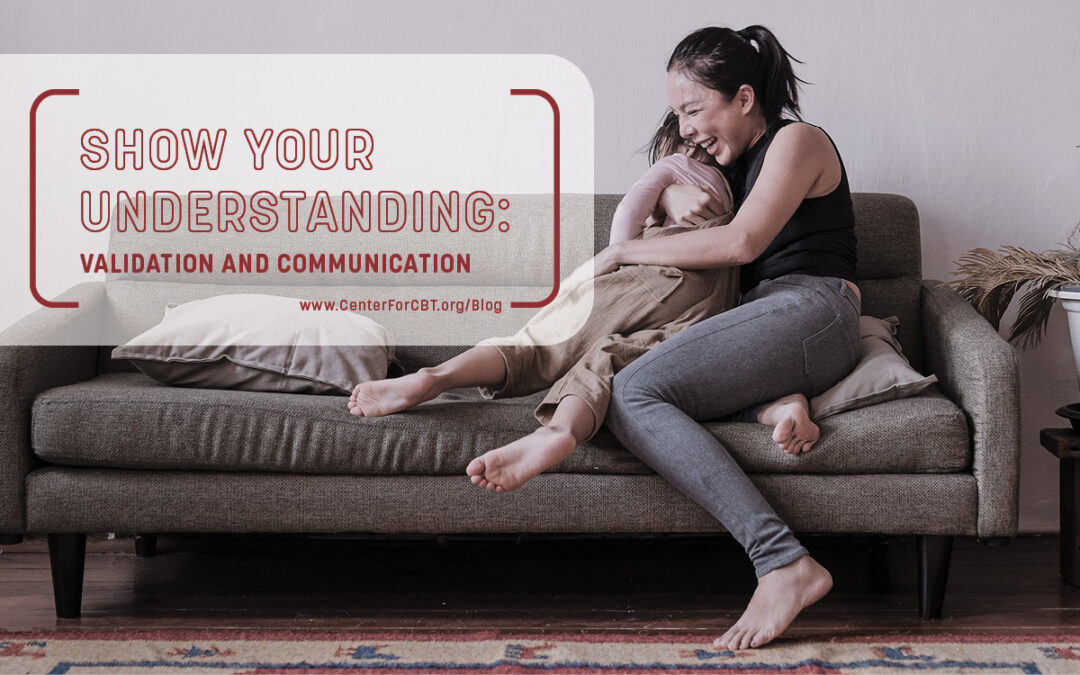Those who practice validation can learn to de-escalate intense emotions and decrease conflicts, which can improve and strengthen relationships. This is done by building empathy through an understanding of others’ experiences. By helping people feel understood and heard, we can show that we are listening, that we care, and validate that what the other person is saying is important.
When it comes to validation it is necessary to make the distinction that it is not synonymous with approval or agreement. You can disagree with what someone thinks, or believe that you may have acted differently in a situation, and still communicate how someone’s thoughts or feelings made sense given the circumstances. Validation, as it is defined in dialectical behavior therapy (DBT), is when you communicate to someone that what they are thinking, feeling, or doing makes sense and is understandable. You can validate numerous things, including people’s:
- Ways of thinking
- Emotions
- Urges or desires
- Actions they have taken
- Hopes or expectations
- Challenging experiences
Struggling to feel heard? Schedule a free 15 minutes session now.
Validation is a critical DBT skill that can be helpful for you, your family, and others in your life. If a genie inexplicably popped out of a lamp and told me I was bound to only use and teach one therapeutic skill moving forward, as difficult as that decision may be, I would undoubtedly choose validation. It offers an opportunity for you to put yourself in someone else’s shoes and take key steps to foster healthy communication and emotional support. Validation involves the following steps:
- Acknowledge what someone is feeling
- Understand it for yourself
- Communicate that understanding to them
Understanding Validation
When someone communicates to us that we are “crazy,” “overreacting,” or that something is “not a big deal,” that is invalidation. These sentiments, intentional or not, can cause feelings of doubt and the belief that there is something wrong with the person. These can contribute to patterns of thought and behavior related to depression and anxiety. Open acknowledgement of our thoughts, feelings, and actions is necessary to build confidence in ourselves. Ultimately, validation can have beneficial effects on a person’s life and overall mental health in a number of ways.
Practicing Validation
Different forms of validation work for different people. The same statements that are validating for you or I may not be validating to everyone. As they say “beauty is in the eye of the beholder,” we say “ validation is in the eye of the receiver.” A combination of the strategies outlined below is most effective, and can be modified for a personal approach.
Listen + Observe
Show you are actively listening and paying attention by making eye contact, subtly nodding, and refraining from distracting activities like using your phone or tablet. Also be mindful of reactions such as eye rolling, heavy sighing, or interruptions that could lead to invalidation.
Reflect Back + Describe
You can validate by reflecting someone’s feelings back to them without judgment. Phrases similar to “it makes perfect sense you’re worried” or “ it’s understandable that you feel frustrated” can help the person know they are being heard.
Curiously Notice + Ask
Though we can’t read minds, it can be validating to ask what someone is feeling. Be curious about what you are observing, ask questions, and be open to clarification if you don’t get it right. If your teen is sitting alone in a corner with their head in their hands, you may say, “I see you’re off to the corner by yourself, and it seems you’re feeling down. Am I getting it right? How are you feeling?”
Show Tolerance
People’s life experiences can explain why they think and act in certain ways. Remind yourself of what you know the person has been through in their life, and how that could inform their feelings and actions. Try to acknowledge their experiences specifically, for example: “I get that you’re hesitant to make new friends when you’ve had friends bully you and stop talking to you in the past.”
Normalize the Response
It can help to think about how any person would behave in response to a given situation. If your teen wants a later curfew, whether you agree to it or not, you can still validate that it’s a normative, understandable thing that lots of teens want to stay out late with their friends.
Be Genuine and Respectful
Treating the other person as an equal and responding as you would to a friend, shows support and care. Also, being willing to admit mistakes (yes, even you, parents!) can be highly validating. We are all human.
Show That You Care
Sometimes, the simplest actions can be the most validating. Giving someone a tissue when they are crying, offering them a hug, and helping with their wants or needs when you are able shows that you are taking their situation seriously and that what they are feeling is important.
Applying Validation
Offering validation and helping someone cope with a given situation can be challenging in and of itself. Even if you are unsure of how to respond to someone, using short and genuine phrases like “Of course,” “That makes sense,” and “That’s understandable” can still show your support and offer validation.
When applying validation to your own or another person’s situation, be sure to validate the valid, not the invalid. Consider a situation in which you or your child rushed through preparing for a presentation last-minute. As a result, you received low marks or negative feedback. You can validate the feelings of disappointment, frustration, and embarrassment you might be feeling. To that same end, the lack of preparation for the presentation that led to the low marks should not be validated.
In addition to validating others, it is important to validate yourself, too. Self-validation involves perceiving your own feelings, thoughts, and actions as making sense. This is also an opportunity to check in with yourself that they are acceptable in a particular situation. Engaging in this practice is an important lesson in empathy. It is reciprocal by nature; by giving validation to ourselves and others, we can work to build stronger social bonds through mutual support and understanding.



